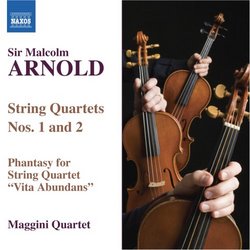| All Artists: Malcolm Arnold Title: Sir Malcolm Arnold: String Quartets Nos. 1 & 2 Members Wishing: 0 Total Copies: 0 Label: Naxos Original Release Date: 1/1/2007 Re-Release Date: 3/27/2007 Genre: Classical Styles: Chamber Music, Historical Periods, Classical (c.1770-1830) Number of Discs: 1 SwapaCD Credits: 1 UPC: 747313276226 |
Search - Malcolm Arnold :: Sir Malcolm Arnold: String Quartets Nos. 1 & 2
CD Details |
CD ReviewsNightmare Quartets Dace Gisclard | Houston, TX | 04/17/2010 (5 out of 5 stars) "I love these bizarre quartets, but they definitely are NOT for those seeking "soothing, delicate chamber music". Often the music suggests the alcohol-induced hallucinations of the art of Francis Bacon (Arnold, too was a heavy drinker). Even more than in Mahler (whose works Arnold admired), Arnold's "normal" and commonplace passages are all the more disturbing for their incongruity. Arnold's idiom in such works is a reflection of his unsettled domestic life--read one of his biographies. Not even Bartok's Quartets are so unsettling. Perhaps only Crumb's "Black Angels" surpasses Arnold in sheer yield of gooseflesh, but Sir Malcolm does not aim for so superficial a response. Arnold the man could be disarmingly convivial, yet also coarse--both traits come through in his music. For those who have come to love this tragically self-destructive composer, who wrote so much great and lovable music, this CD will be an indispensable supplement to the self-portrait of his symphonies. Unlike much of his usually light-hearted chamber music, the tone of these quartets is deadly serious. Bartok is in Arnold's First Quartet. In 1949, Bartok had only been dead about four years--yet this is NOT a photocopy of his style, and certainly NOT of his comfortable "Hungarian folksy" side (Arnold's Symphony No.1 is from the same year). In the first movement, the smears, glissandi and aggressive accents bring to mind the older composer. However, the music could never be mistaken for Bartok, and there is nothing in Bartok's Quartets quite like the discordant shrieking of the violins whining above the Stravinskian buzz of repeated pizzicati in the trio of the scherzo. A joke? my...uh...foot--rather, the most sarcastic of black humor. The slow movement is intentionally fragmentary, but not aimless. Eerie ponticello glissandi and bare, meandering solos over pizzicati create a feeling of isolation and deep melancholy. The finale begins in a lighter mood, but seems trapped in its own futile cheerfulness, never really gets anywhere, and ultimately fizzles out in a whimper. Thirty-six years and seven symphonies separate Arnold's two quartets. Although No.2 begins more lyrically, Bartok still lurks nearby in heavy bow scraping and grating harmonics. Yet, in the final bars of the first movement, the surrealist descent into the more banal sort of 40's romantic movie music is pure Arnold. So, too, is the trivial "Irish" fiddle tune in the trio of the "scherzo" meeting with the violent protests of the other players. This is reminiscent of similar episodes in the seventh and eighth symphonies. But Arnold isn't merely presenting a sideshow of grotesques. There is numb desolation yet also warm humanity in the stark polyphony of the slow movement. At first, the tone is wounded and withdrawn, then--in the chorale-like theme--injured and prayerful--a cry from the heart. This De Profundis could coax tears from a stone, and is all the more moving for being so brief and understated. In the finale, a sweetly lyrical melody passes among the instruments against a wavering accompaniment. Harrowing violence interrupts, alternating with glissandi suggestive of wriggling coffin-worms. Yet again, the coda is as ingratiating as the endcast music of a 40's romance movie--sincere or insincere?--who can tell? Again, the ending is intentionally inconclusive. Those familiar with the Maggini Quartet's growing catalog of British quartets will expect of this group the highest standards of technique and interpretation. They will not be disappointed with the present disc. These are, as they should be, performances of extremes, yet always within a musical context--never facile shock tactics. Their accomplishment is all the more moving for not tearing a passion to tatters. This disc is also valuable for containing the early "Vita Abundans" Phantasy as a makeweight. (Neither the McCapra nor the Allegri Quartets' recordings contain this piece.) Influenced by samba, fandango and blues, the Phantasy is lighter in tone than the quartets, yet still a serious work. Despite the dissonances, the idiom is tonal, and the final cadence, triadic. Even so, the CD is a little scant on playing time (c.57 minutes). However, the quality of the music and the performances, and the NAXOS pricetag should leave no room for protest. Highly recommended to Arnold fans, and adventurous listeners with strong stomachs and empathy for human suffering." Amazing Arnold C.D. Wexler | 12/22/2009 (5 out of 5 stars) "This CD is a marvel. Every work on the disc is worth hearing over and over. Arnold's quartets are strong modern works that challenge and satisfy the listener."
|

